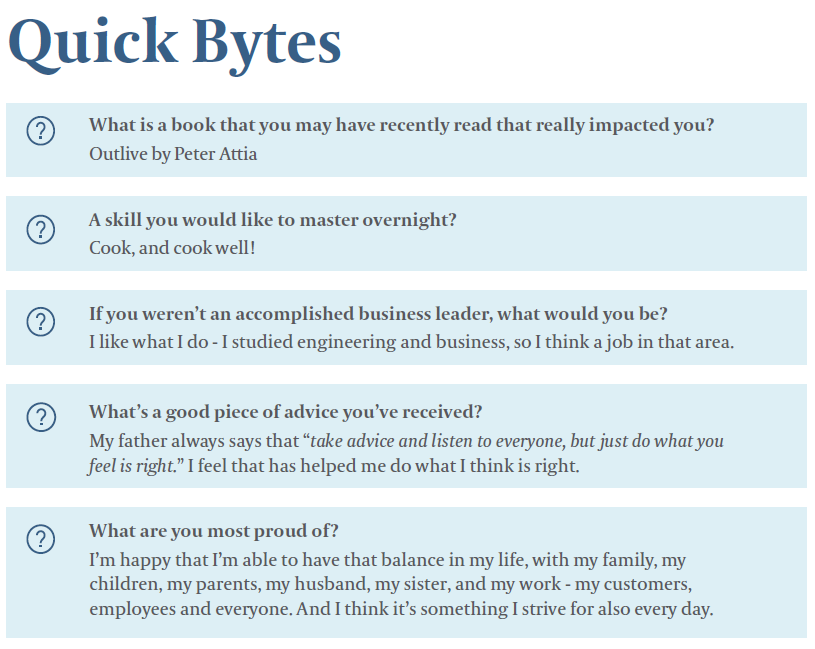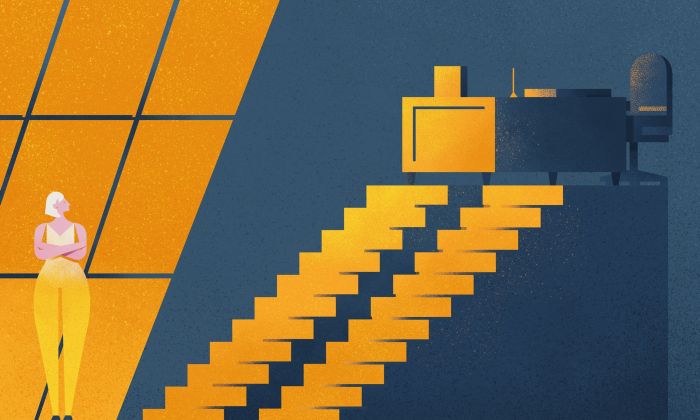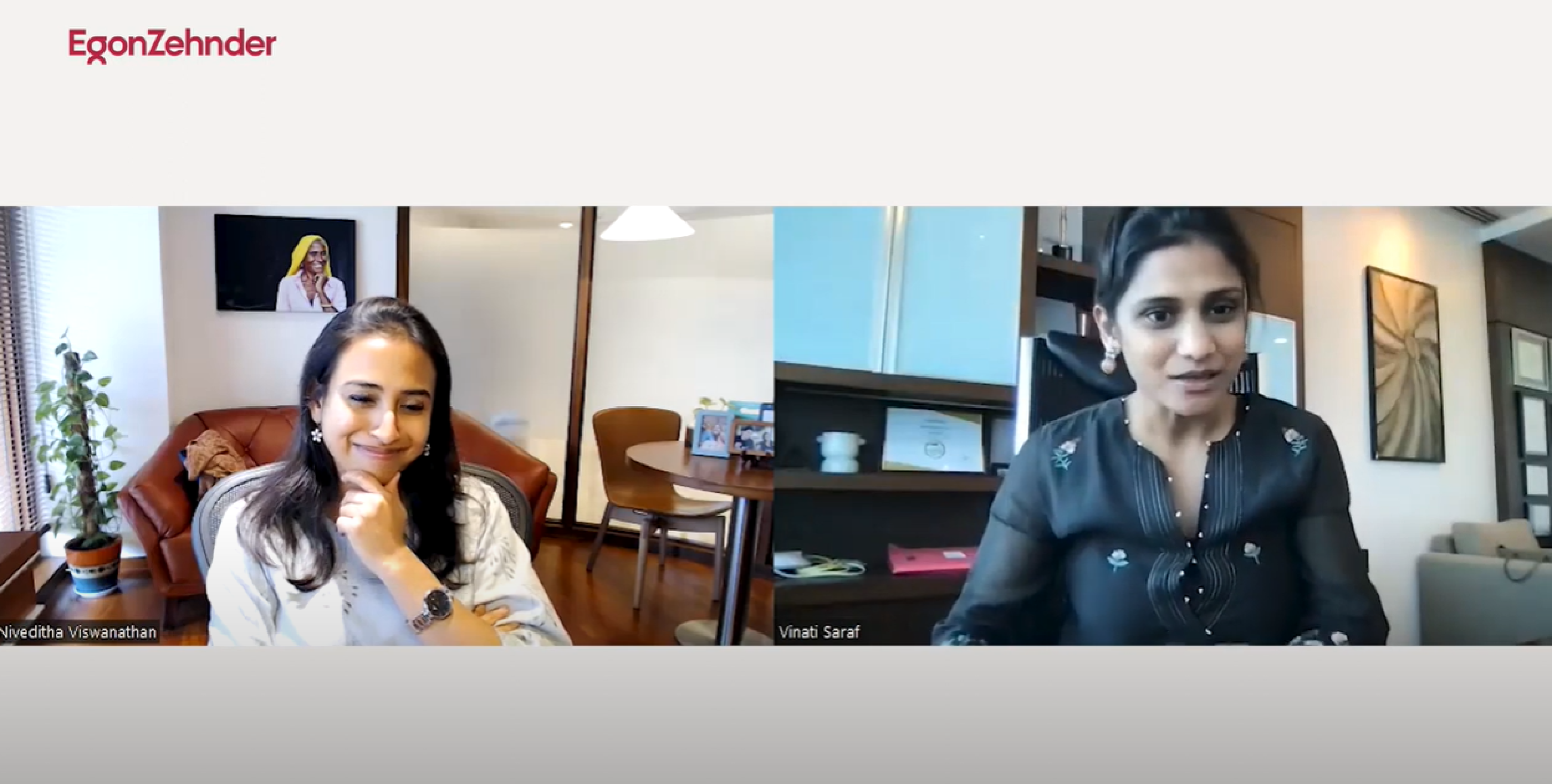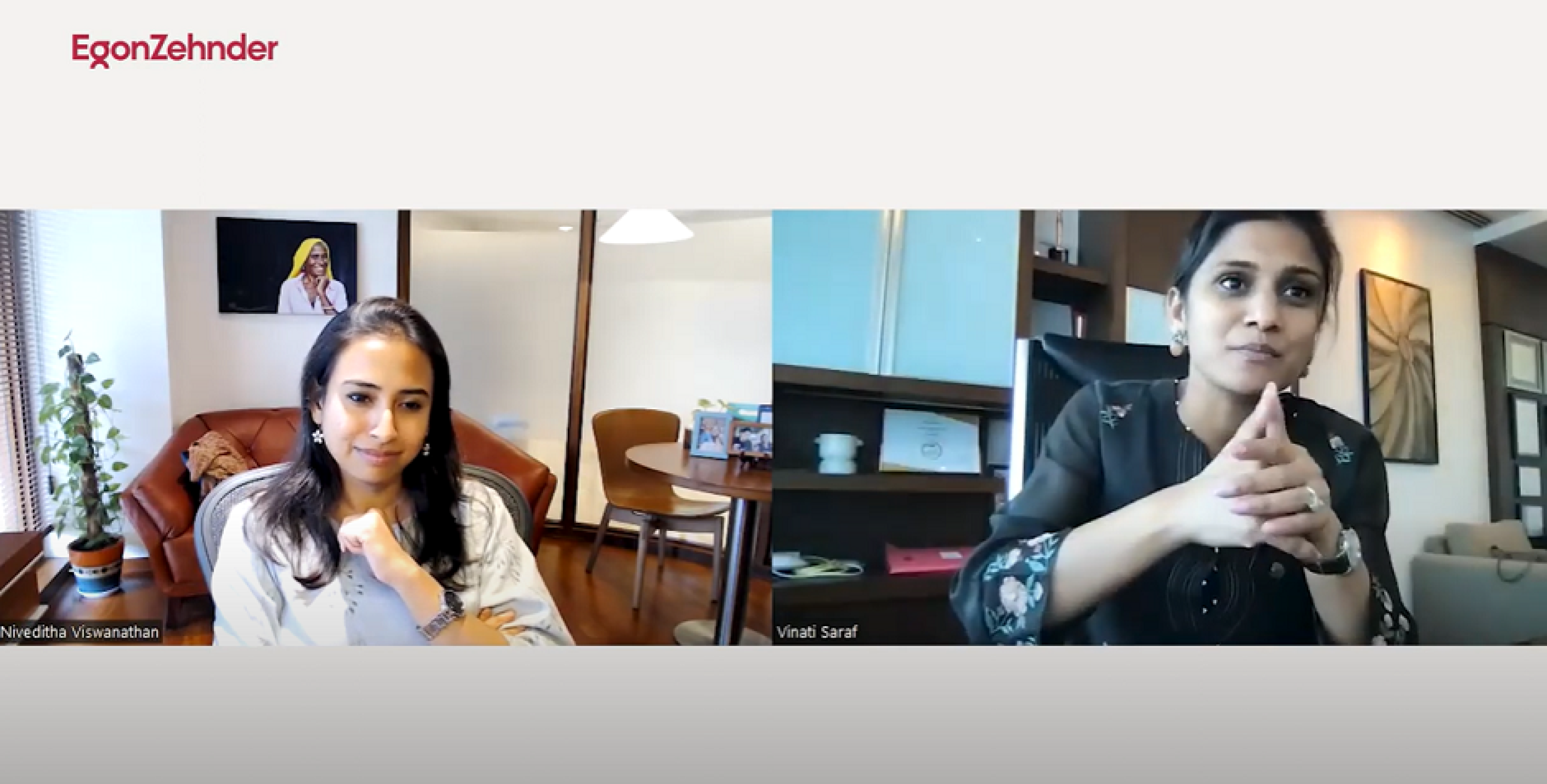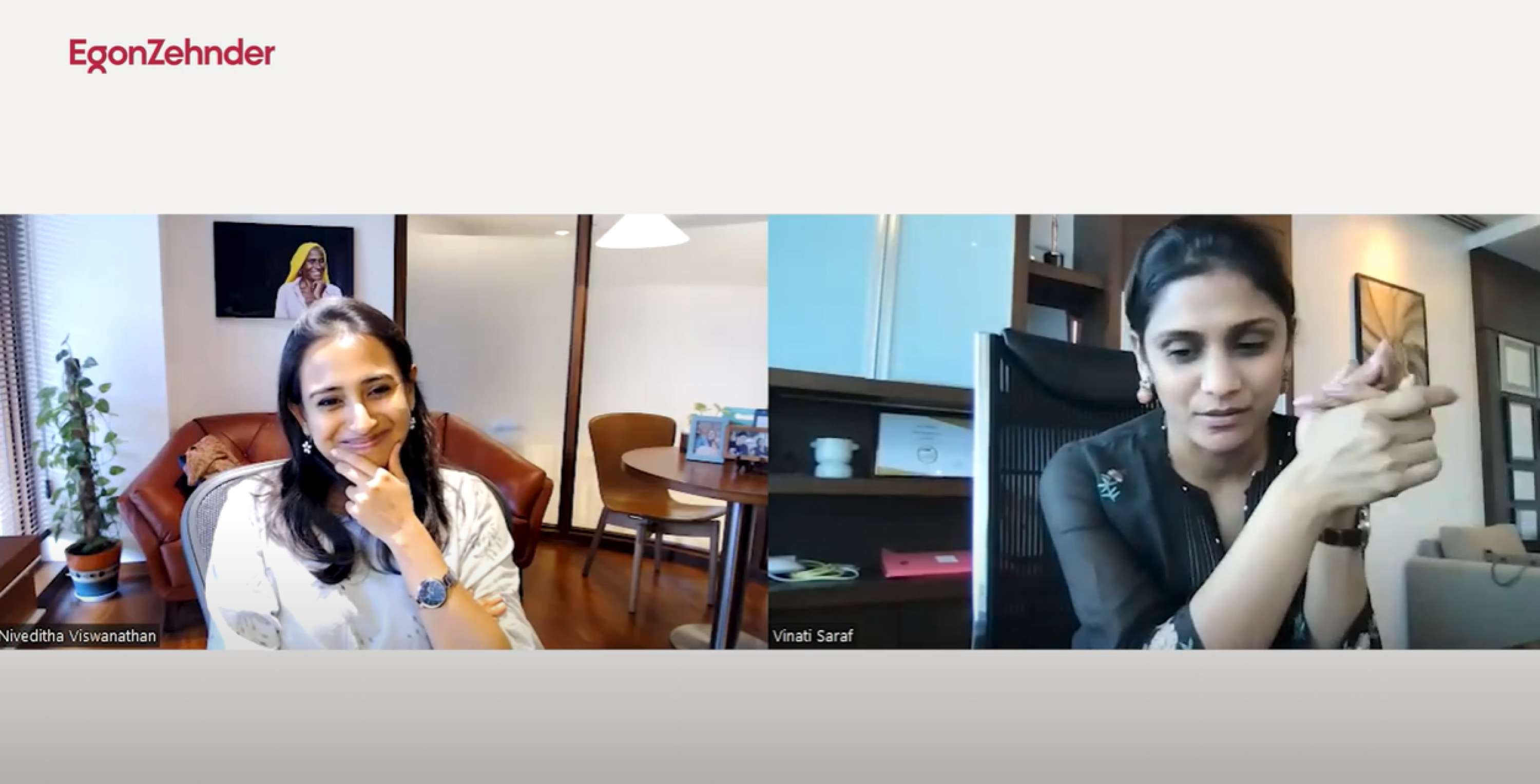Editor's Note: This interview is part of the Blazing a Trail: Women in Leadership series
During her childhood, Vinati Saraf Mutreja regarded her family visits to the company’s plant as exciting “weekend trips.” Little did she know at the time that she would eventually become the Managing Director and CEO of Vinati Organics Limited, the very company her father had proudly founded. From these early days, all the way to earning her dual Engineering and Business degrees, her journey unfolded naturally, guided by her passion for chemistry and the business.
We had the pleasure of sitting down with Vinati for an interview, where she reflects on her trajectory, revealing that even though scaling a business seemed like a major challenge, she always pursued doing what “would be right for everyone,” and no challenge was greater than motherhood. This fascinating conversation leaves us a resounding message—to follow one’s calling, doing what’s right, and instilling a sense of pride in others.
Read on for our conversation highlights:
Vinati, what were some early memories that shaped you?
Being exposed to the business early on shaped me and deeply entrenched my interest. My father started Vinati Organics in 1990 when I was only six years old. My early memories are going with the family to the plant site—it was like a weekend trip. As I became a teenager, my father, who has no background in chemistry, would ask me questions about topics such as molecular weight and the periodic table, mostly to increase his understanding, and that’s how my interest in chemistry developed.
By the age of 17, I went to UPenn for a dual undergraduate degree in Engineering and Business. Whenever my father was visiting me, he’d take me to customer meetings, and that’s where my exposure to the business started. Post my undergrad, I stayed back in the U.S. for a job at a consulting firm but within a year I came back as I knew that there was a lot to be done, and a difference to be made, back home.
It is rare that someone gets into business conversations at such an early age as you did. What made your father bring you into it?
My father did it without much complicated thought to the matter. During school years, it was mostly just discussing chemistry problems, and my real exposure began during my undergrad when meeting with major customers. This enabled me to understand the key facets of the business. During my summer internship at Vinati, I was fortunate to attend Board meetings as well, and while I couldn’t pick on the nuances, I did get an idea of the key trends.
It was quite similar to my father’s journey. He had a BCom degree at 17 and an MBA degree at the age of 19, and then started working right away.
You mentioned that your father didn’t particularly have a background in chemistry. What prompted him to start something in the field?
He worked at Aditya Birla from 1984 to 1990 in their chemicals division, where his role was to scout new chemical projects. In that process, within 6-7 years he ended up studying many chemical processes and visited many companies and, in fact, became the MD of Mangalore refineries when he decided to leave and start out on his own.
It is one thing to take on a business, and entirely another to grow it to the scale you have. When you took over the decision-making in the company, did anything change? Did you have to learn or unlearn anything?
I’m still learning. I took on the MD role in the last five years, having joined in 2006. Before that, I spent time learning about various aspects of the business by shadowing people. There are people in our company who have been around for a long time and sometimes they just know better about what they are doing than I do. So that is that – there is wisdom around and I was happy to take it.
Scaling up also happened organically. To be honest, in 2006, neither me nor my father would have imagined getting to the scale we are at now. We just did what we thought was the right thing at any given point in time. When we realized that a product made sense, we forward integrated into that. If the raw material was not available, we started making it and backward integrated into it.
Then we realized that we could sell IBB to others, so we expanded the IBB capacity. We became the only IBB manufacturer in the country and felt that we could also make butyl phenols because nobody else was making that in India. So, with that, we had the butyl phenols, using which we could even make antioxidants which India is a net importer of and so we made that. Essentially, I just looked at our core competence and did what I thought was the right thing at any given point.
It sounds like a process of natural discovery. Were there particularly rewarding accomplishments you could share with us?
There have been many instances over the years, one of them being when we got our first large, long-term export contract. That was a really important milestone because many followed suit. Then we got ISC to invest in our company in 2010-2011, which was another big sign of validation. It raised our credibility when someone like ISC invested in us. When our largest competitor decided to exit business, it felt that we must have done something right.
In what ways did you choose to do things similarly or differently than your father’s approach to the business?
We are very different from each other, and we just agree to disagree. It’s OK if we have a different point of view. We discuss it and whoever can convince the other person we go that way. It’s very objectively decided.
In terms of being a custodian or an independent leader, I think it has to be both. I can’t negate the fact that I’m the founder’s daughter and I am here because of that. And now, at the helm of the company, I have a certain responsibility towards everyone, to the employees, to the customers and it’s my job to grow and to make the decision that I think would be right for everyone.
As the leader of the company, you have to tackle all aspects of it. Are there parts you don’t enjoy, and what are the parts you get energized by?
You can’t choose—as you said, you must put in a thought to everything. Additionally, having a good team makes all the difference. I think I’m strong when it comes to matters in finance and sales – it is natural for me. However, for operations, I rely more on what my COO is saying. When you have the right set of people, and you understand your strengths and weaknesses, then you can get to accomplish anything.
It’s not every day that I encounter a female leader sitting at the other side of the table when it comes to a chemicals company. How has being female and a young leader shaped your approach?
I have realized two things: One, in our industry (manufacturing), gender matters very little. It’s all about the product, and ours is very simple. What truly matters is the pricing and quality. Beyond that, the customers do not care as it’s a very transactional B2B business. I realize it’s the same within your team. Externally, if you know what you are saying, and you make objective arguments, then within a matter of minutes, they’re over any potential bias.
The larger challenge is being a young leader. It’s an industry where experience is looked up upon and that matters. That is a bigger challenge to overcome than gender, in my experience. Being young doesn’t bother me anymore. Initially, I realized that I had to know more than what I was expected to know, because anything could be thrown at me, and I better know the answer. But I would say that those days are behind me; now, I’m almost 40 and somewhere that hurdle has been crossed.
Looking back, what has been the most challenging time for you?
Managing the business was easier overall. The most challenging was when I became a mother for the first time in 2011. The world was different than what it is today – that was challenging. In the last few years, women coming back to work is a lot more common.
Even my own family had to get accustomed to the fact that I truly wanted to lead Vinati Organics. I wanted to make it into something, keep doing what I was doing. And somewhere, the conditioning around you makes you feel guilty. So that internal dilemma was what I was constantly battling with till at least for a couple of years after I had my firstborn. Then I realized that this company was my calling, and I just couldn’t not come back to work. It took me 2-3 years to overcome my internal struggle and do what I think was right for myself.
Did you overcome these challenges on your own, or did you have mentors or any other support system around you?
My husband is my biggest cheerleader and a very supportive spouse. My in-laws have been very supportive; they moved in with us when my son was young so that I could go to work. My mother helped me a lot as well. Even today, we live in the same building and if I’m traveling, she’s always there for my kids. I took help from whoever I could, and all my family members were, and still are, there for me and I feel truly blessed in that regard. And that’s the best way to do it, if you ask me – to seek help from everywhere!
Vinati, are you proactively doing anything different to retain women or enable more women to continue on their journeys and careers within Vinati Organics?
One, there’s a dearth of women in the chemical engineering career, and it isn’t easy to find them. If at all we do, we are very happy to recruit them and go beyond what is required from us in terms of maternity leave, work from home and many other things. In fact, four of our eight board directors are women, which tells you that we are not just keeping women for the sake of. On that note, we have very good retention rates, very few people leave our organization. People stick around with us.
You mentioned earlier in our conversation saying, “look I’m still learning, and I’m figuring this out as we go.” Do you have a designated mentor?
I wouldn’t say that I have a mentor, but YPO and EO have helped me. I am on the two forums there and I am able to get good inputs and feedback. They call it Board of Directors for Life, so I’m able to share all my work and personal things with them. Everyone is in similar boards as you are, and this group of people have really helped me.
Would you say you’re reasonably disciplined in keeping a balance in life?
I’m okay with the balance. I’m thorough with my workout with at least one form of exercise a day, can be yoga, Bollywood dance, kick boxing, something that keeps changing. I take care of my diet and my sleep. On weekends, we go out as a family and travel when the kids have holidays. I try to maintain a good balance with my work and personal life.
Your company is named after you, and it’s a certain sense of responsibility that you carry. How would you like the world to remember you?
Once I’m gone, I’m gone. But I do want to leave respect for my children. They should be proud of who they are and where they come from. And same for whoever is associated with our company, they should feel a sense of pride that they are with us.
